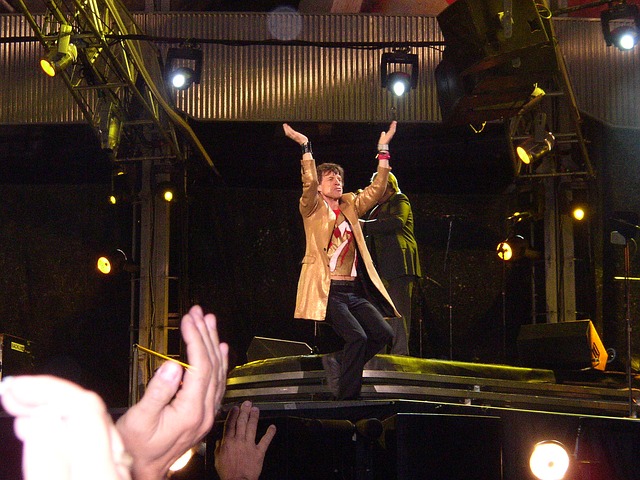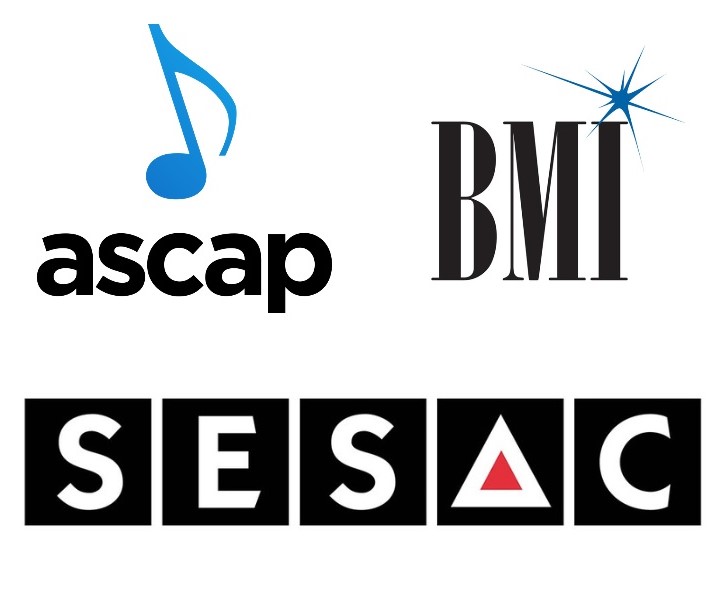This week we again hear from Chris Tanner, who is an artist, musician, and inventor but is also a patent attorney. He holds several copyrights himself as a composer, is a former Patent Examiner, holds seven patents himself as an inventor, and has been practicing in patent, trademark, and copyright law for 21 years. More information can be found at either TannerPatent.com or SaveMoneyOnPatents.com.
 Tribute bands make a lot of business sense, although they certainly skirt the boundaries of copyright and trademark law. These two legal areas overlap, but still have a lot of differences. In either case, imitation is the sincerest form of flattery, but is it infringement? One would think that tribute bands would have to seek approval directly from the original artists and pay for the use of their songs. This is not the case.
Tribute bands make a lot of business sense, although they certainly skirt the boundaries of copyright and trademark law. These two legal areas overlap, but still have a lot of differences. In either case, imitation is the sincerest form of flattery, but is it infringement? One would think that tribute bands would have to seek approval directly from the original artists and pay for the use of their songs. This is not the case.
The current music licensing system is designed more for cover bands, which generally tend to perform on a much lesser scale than tribute bands and vary the songs they perform. As such, tribute bands kind of “fall through the cracks” in copyright law (of which there are plenty). But is anyone really harmed? How much of that revenue truly belongs to the original creator?
COVER BANDS v. TRIBUTE BANDS v. REVERENCE BANDS
Tribute bands do not perform original songs. Instead, they exclusively perform songs by the band they pay tribute to, usually mimicking the band’s appearance, style, and name, often at a fraction of the price. Many tribute acts are merely overzealous fans badly imitating their heroes, but some can actually make a living. A surprising number sell out major venues in cities like San Francisco and Los Angeles, and hire an agent.
There has been an increase in both tribute and cover bands that perform copyrighted music popularized by other bands. These bands exclusively perform copyrighted works of other artists, often paying little or nothing directly to the copyright holders. “Cover bands” perform a variety of popular artists’ songs, while “tribute bands” focus solely on one artist or creator. Tribute bands tend to perform on a larger scale than cover bands, some having both national and international success.
There exists another even more strange type of band, a “reverence band.” These nut-cases adopt the persona of the original artists through the use of costumes, make-up, stage dress and effects, and/or between-song patter that quotes the original artist.
REACTION OF ORIGINAL ARTISTS
 The original artists vary in terms of their reactions to tribute bands, ranging from supportive to litigious. Some legal scholars suggest that tribute bands can and should negotiate directly with original artists for the use of their works. I disagree, and many prominent artists also disagree, among them Mick Jagger (pictured). However, Bon Jovi’s lawyer once sent a group called “Blonde Jovi” a cease and desist letter. Gail Zappa alleges that bands cannot play her late husband’s music up to par, and therefore they tarnish his image. She has been using legal threats in an attempt to discourage unauthorized performances of Frank Zappa’s music, accusing tribute bands of “identity theft”.
The original artists vary in terms of their reactions to tribute bands, ranging from supportive to litigious. Some legal scholars suggest that tribute bands can and should negotiate directly with original artists for the use of their works. I disagree, and many prominent artists also disagree, among them Mick Jagger (pictured). However, Bon Jovi’s lawyer once sent a group called “Blonde Jovi” a cease and desist letter. Gail Zappa alleges that bands cannot play her late husband’s music up to par, and therefore they tarnish his image. She has been using legal threats in an attempt to discourage unauthorized performances of Frank Zappa’s music, accusing tribute bands of “identity theft”.
On the other side, many bands enjoy tributes, such as Elton John. Several of the remaining living members of Queen put together their own tribute band, the Queen Extravaganza. They are producers of the show, so they profit from this venture. Similarly, several other artists have blessed one tribute band as their official tribute band. For some famous artists, the motivation is to make sure a band playing their act keeps up the quality.
In other cases, the members of a tribute band are often more committed to getting the song right than the original artists. For example, the Rolling Stones are now so aged and decrepit that in their 2018 concerts, it is very apparent that they no can longer effectively play significant portions their music, and have become somewhat of a parody of themselves, a type of “karaoke band” that sounds, frankly, quite awful at times. They often slop their way through their most famous hits, merely approximating certain songs and often very clearly not even making an effort to get the song right, giving their tour the nickname “Steel Wheelchairs.” Meanwhile Rolling Stones tribute bands are often significantly more committed to getting the songs right and accurate.
TRIBUTE BANDS AS A WAY OF DEVELOPING ONE’S MUSICIANSHIP AND PROFESSIONALISM
Tribute bands vary widely in their rates of success. Some tribute bands are strictly local in nature, playing few performances for small crowds making little money. However, other tribute bands achieve both national and international success. As the name suggests, some tribute musicians love the original band. Others join because tribute bands represent dependable income in a difficult industry.
A good tribute band, however, has the potential to land in front of large audiences very quickly, which is a difficult threshold. Many musicians never reach this. After all, everyone already knows the music. They don’t need to create a fan base; they just need to prove they can satisfy the expectations of the huge, hungry fan base that already exists.
As will be discussed in more detail below, BMI and ASCAP provide what are known as “blanket” licenses, meaning that they automatically grant licenses to anyone willing to pay a standardized fee. This means there’s almost no barrier to starting a tribute band. Some tribute bands play bars that fit 200-1000 people as typical venues, also with corporate conferences and parties as staple in the tribute band business.
ASCAP/BMI/COMMERCE
 Tribute bands are covered under the same licensing agreements as cover bands and other live musical performers. These performances do not infringe upon the rights of the copyright owner when done with permission. The three major performance rights organizations ASCAP, BMI, and SESAC, negotiate licenses for the use of copyrighted works and collect fees for the public performance of those works.
Tribute bands are covered under the same licensing agreements as cover bands and other live musical performers. These performances do not infringe upon the rights of the copyright owner when done with permission. The three major performance rights organizations ASCAP, BMI, and SESAC, negotiate licenses for the use of copyrighted works and collect fees for the public performance of those works.
A common method used by these organizations are blanket licenses, which involve pooling and licensing of copyrighted items in a single package which allows the licensee to use any and all of the items in the package as often as they wish. Blanket licenses permit tribute bands to exploit an artist’s entire repertoire without having to directly compensate or seek permission from the original artists. Owners of venues where tribute bands perform are required only to purchase blanket licenses. Blanket licenses serve to limit the expense and difficulty of negotiating licenses with various copyright owners. ASCAP provides over 100 different types of blanket licenses that vary in price, depending on the type of business seeking the license.
TRADEMARKS AND COPYRIGHTS
Tribute bands are often named after the original artist to whom they are “paying tribute.” Tribute band names are often a play on the original artist’s name, which are valuable federally Registered trademarks, using similar names such as “Blonde Jovi” and “Lez Zeppelin.” Most tribute band names are followed by the phrase “a tribute to [insert name of original artist here],” so that trademark confusion is reduced.
Interestingly, “Fair Use” doctrine exists for both copyright and for trademark. However, the thresholds are very different. A question exists whether tribute bands are protected by fair use. The answer is “no, not really,” but also, “who cares,” and “almost no one ever attempts to litigate this, as it’s not worth it.” Trademark infringement is a federal case, which means expensive litigation. An original band would spend $150 thousand or more for an injunction, the potential damages may not be that high, and stopping each tribute band requires a separate lawsuit. Threatening legal action is much cheaper. Occasionally such threats make tribute bands cease playing entirely. More often, they change their name or stop using the logo and keep playing.
STIGMA OF TRIBUTE BANDS
We shouldn’t look down on tribute bands. Performers like Sinatra almost exclusively sang songs written by others. Even symphony orchestras are tribute bands, they do Beethoven and Tchaikovsky covers. There is at least one website dedicated strictly to tribute bands, tributecity.com. There are numerous Justin Bieber tribute bands.
The lines between tribute band and original band can also blur. In 1995, singer Tim Owens went from lead singer of a Judas Priest tribute band to the lead singer of Judas Priest as he replaced its departed frontman. Mark Wahlberg starred in an awful movie about this strange event, called “Rock Star” (2001). Unfortunately, Marky Mark’s attempt at authentic singing in this movie was not much different from his fake bad singing in either “Boogie Nights” (1997) or “Ted” (2012).
Performers in tribute bands often straddle the border between professional musician and struggling artist. Musicians in popular tribute bands may hire an agent or producer (if they don’t already have one), they can expect fans to sing along at every concert, and they can tour full-time. On the other hand, they don’t get the full rock star treatment. The money can be good, although often not. Very elite tribute bands (of which there are few) might reach low six figures.
Tribute bands make economic sense. Most profits in the music industry are concentrated in the hands of a few lucky individuals. But they still can only perform in one venue at a time. Until bands start playing multiple locations at once (e.g. by cloning themselves), tribute bands are an obvious solution.
Further, tribute bands still allow plenty of room for creativity and entertainment musical expression and development. Additionally, no tribute band has ever refused to play its hit song, pissing off their audience. Kurt Cobain was famous for this with Nirvana, refusing to play “Smells like Teen Spirit,” and when the request was screamed enough times, spitting on his audience.
Read previous guest blogs from Chris Tanner about YouTube, one about Performance Rights Organizations (PROs), and, a blog from two weeks ago about the importance of copyrights.
Talk about tribute bands and this week’s blog in our Facebook group!
